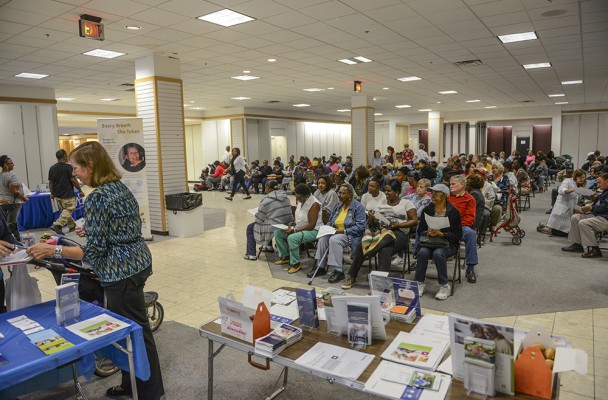School of Pharmacy provides free medical care to local communities

Community members receive medicine at the over-the-counter medication giveaway event at the High Point Community Center. Photo by: highpoint.edu
By Alexis Ancel // News Editor
Adequate medical care can be easily taken for granted. For many, access to proper medication and routine checkups is not a luxury they can afford. As the only pharmacy school in the Triad, High Point University’s Fred Wilson School of Pharmacy decided to take action and provide medical services and supplies to those in need.
This project required a great deal of teamwork from many departments at HPU. All faculty within the basic and clinical sciences have been involved in at least one event and collaborators from various departments have played different roles in identifying which problems to address and how to go about solving them.
Dr. Courtney Bradley, assistant professor of Clinical Sciences, said, “As we begin enrolling students in the School of Pharmacy, students will be working hand in hand with faculty members, and it will be a wonderful opportunity for these students to develop a passion for service that they can continue in their future careers.”
Dr. Mary Jayne Kennedy, department chair and professor of clinical sciences, was one of the main orchestrators who made these events possible.
“One of our immediate goals was to find ways we could use our unique expertise and training as pharmacists to give back to the High Point community,” Kennedy said.
In order to host various events, the School of Pharmacy partnered with local organizations such as NC Med Assist, the Washington Street Business Association and the Triad Food Pantry of the Seventh Day Adventist Church. Events so far have included free blood pressure screenings, monthly health screenings and an over-the-counter medication giveaway. So far, their resources and expertise in the field allowed them to help over 2,000 people in the community and this number is expected to rise.
“The response and support we have received from the community has been overwhelmingly positive,” Kennedy said. “We have been able to develop relationships with our community members that will allow us to expand our programs even further and have an even greater impact.”
Despite the enormous difference they have made thus far, there is still work to be done on this problem. With over 80,000 people in the area under the age of 65 without health insurance, this has been made into an ongoing project that the pharmacy department plans to expand in the future.
Every location has to do with whether or not health care is available. As Kennedy explained, “High Point has been designated by the Health Research Services Administration as medically indigent and as a health professional shortage area, meaning that there are not enough health care providers to take care of the individuals within our community.”
For some, access to health care even boils down to something as simple as transportation. The team aims to solve this dilemma as well by beginning to collaborate with the Community Clinic of High Point, where they are working to start a pharmacist managed clinic that allows the health care provider to come to the patient instead of vice versa.
“I feel very fortunate that the School of Pharmacy is invested in continuing these efforts,” Bradley said. “Each time I volunteer at one of these events, a part of me becomes invested in at least one community member, and I look forward to continuing to help one patient at a time in our local community.”